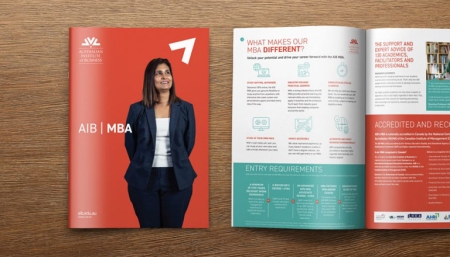Decoding decision fatigue: Insights from the C-Suite to parenthood

Due to the fast-paced nature of modern society, decision fatigue has become an increasing issue for many, affecting both productivity and overall well-being. At AIB, we continually seek to empower our community with insights and strategies to tackle these challenges to enhance both personal and professional life. On the 7th of March at our Sydney networking event, we had the incredible opportunity to hear from Therese Frangie, CEO of Mad Mex and AIB MBA alumna. Therese shared an inspiring keynote speech on her experience coping with decision fatigue as an executive and a mum of three.
About Therese Frangie:
Therese Frangie is a visionary leader whose journey is proof of the power of resilience, efficiency, and strategic planning. As the CEO of Mad Mex, she has played a crucial role in cultivating the company’s culture and spearheading its success, all while juggling the demands of motherhood and her own personal development. Her academic journey through AIB, culminating in an MBA with a stellar GPA of 6.0, shows her dedication and ability to manage decision fatigue effectively.
Therese started her talk by sharing a personal narrative that resonated with many. She recounted the challenging period during the COVID-19 pandemic when she was balancing her MBA, working from home, caring for her children and expecting another child. This period required remarkable efficiency and clear thinking, leading her to create strategies to combat decision fatigue.
The concept of decision fatigue
Therese dived into the concept of decision fatigue, explaining it as the deteriorating quality of decisions made by an individual after a long session of decision-making. She highlighted the work of Baumeister in 1988, which introduced the idea that our cognitive resources are finite; the more decisions we make, the more depleted these resources become, leading to poor choices or procrastination.
Our working memory is extremely limited in both capacity and duration, meaning a heavy cognitive load can negatively affect our ability to complete tasks. This was something Therese could not afford as a professional, a parent and a student striving for a perfect GPA. Overcoming decision fatigue to maintain cognitive capacity was a crucial part of her narrative.
Further expanding on this concept, Therese mentioned the work of Kahneman in 2011, who distinguished between two types of thinking: System 1, which operates automatically and quickly with little or no effort, and System 2, which allocates attention to the effortful mental activities that demand it. This differentiation emphasises the importance of managing our cognitive resources to maintain decision-making efficiency.
Therese shared notable examples, such as the consistent wardrobe choices of Steve Jobs and Mark Zuckerberg, to illustrate how minimising trivial decisions conserves cognitive energy for more significant matters.
Strategies to combat decision fatigue
In addressing the widespread challenge of decision fatigue, Therese shared a suite of strategies that she has personally implemented to navigate the complexities of her demanding roles as a professional, a parent and a student. These practical strategies act as a blueprint for anyone looking to enhance cognitive efficiency and decision-making capacity.
Automate the mundane
Therese advocates for automating as many routine decisions as possible to conserve mental energy for more complex and significant tasks. This includes making habitual choices about everyday matters, such as pre-planning outfits for the week or automating meal decisions through meal prep and subscription services. The goal is to reduce the number of daily trivial decisions to preserve cognitive bandwidth for tasks that require more substantial decision-making.
Morning routine
A structured morning routine can set the tone for the entire day. Therese believes her disciplined start to the day provides her with a sense of control and momentum. By following a set routine each morning, from exercise to meditation and strategic planning for the day ahead, she minimises the need for decision-making upon waking. This autopilot mode helps conserve mental energy for more demanding decisions later in the day.
Capsule wardrobe
Therese adopts a minimalist approach to her wardrobe to limit the mental effort spent on choosing outfits. She has a capsule wardrobe, a small collection of interchangeable items that all work together. This not only saves time but also reduces the mental burden of sorting through an abundance of clothing choices, ultimately freeing up energy for more important decisions.
Meal planning
Therese has an eight-week rotating menu for her family’s meals to simplify grocery shopping and ensure a balanced diet without the daily hassle of deciding what to eat. This approach eliminates the daily decision-making associated with meal times, thereby reducing overall decision fatigue.
Digital to-do lists
Keeping a digital to-do list has been crucial for Therese in managing her responsibilities. Digital tools allow for easy updating and access, ensuring tasks are organised and prioritised efficiently. This system helps break down larger projects into more manageable actions, making it easier to focus on completing one task at a time and reducing the overwhelm that can come from juggling multiple projects and deadlines.
Therese highlighted that these strategies not only combat decision fatigue but also enhance cognitive efficiency, allowing for better decision-making in areas that truly matter. The discipline of a morning routine, the simplicity of a capsule wardrobe, and the efficiency of meal planning and digital to-do lists are strategies everyone can use to navigate daily life more effectively.
Facing career challenges head-on
Therese opened up about the resilience and strategy behind her career’s significant challenges. She shared the personal difficulties she encountered during her maternity leaves, where on two occasions, the stability of her position was tested. However, this troubling experience turned into a learning opportunity and highlighted her leadership qualities.
The challenge of coming back to work, aware of the potential risk to her role, demanded clever planning and a strong mindset that could be too much for many. Yet, Therese tackled these challenges with resilience and optimism. She saw these difficulties as confirmation of the unique value she brings to her team and the company. The experience taught her the importance of believing in one’s skills and leaving a strong impact that her position remained essential in her absence.
Therese’s detailed exploration of decision fatigue, coupled with her personal experiences, offers invaluable insights on how to fight this common problem. By applying a systematic, strategic approach to daily life and embracing challenges with resilience and confidence, she demonstrates how it is possible to improve one’s decision-making abilities to achieve professional success while maintaining a balanced and fulfilling life.
Her keynote serves as a compelling call to action for anyone looking to improve their cognitive efficiency and decision-making capacity. Therese’s story and accomplishments prove that with the right methods, beating decision fatigue isn’t just achievable, it’s a way to become more effective and intentional individuals.
Therese’s final piece of advice encourages us all to take a moment, write down our thoughts and identify parts of our lives where we can use straightforward, action-focused “don’t think, just do” approaches to minimise decision fatigue. This strategy not only enhances our decision-making abilities but also leads us to achieve whatever we set out to do.
We extend our heartfelt thanks to Therese Frangie for sharing her insights and strategies with the AIB community. Her journey and achievements are truly inspiring, showing that with the right strategies, we can all navigate the complexities of decision fatigue and lead more efficient, purposeful lives.




